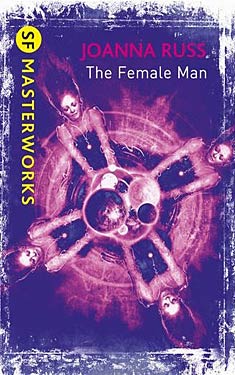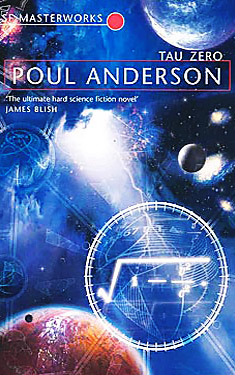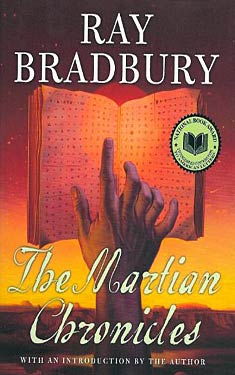Hell is Adaptations: Cloud Atlas

When British writer David Mitchell published Cloud Atlas, the novel struck the reading public as a daring, multilayered work. It was a critical and commercial success, yet seemed impossible to adapt to the big screen. Yet as the story goes, Nathalie Portman shared her love for the novel with the Wachowskis during the filming of V for Vendetta, and the two siblings determined to do the impossible, and bring the book to the big screen.

Photo from the script meeting.
WoGF Review: The Female Man by Joanna Russ
 Daniel Roy (Triseult) is a writer, slow traveler, backpack foodie, endurance runner, and SF junkie. He has lived in Canada, China, and India, and currently resides in South Korea.
Daniel Roy (Triseult) is a writer, slow traveler, backpack foodie, endurance runner, and SF junkie. He has lived in Canada, China, and India, and currently resides in South Korea.
If I taught SF literature in high school, I’d make The Female Man mandatory reading, knowing my students would hate me for it. It’s not an easy book by any means; its structure is complex and obfuscated on purpose, and its subject matter is uncomfortable and necessary. But really, this is why SF exists in the first place.
The book has been heralded as the quintessential feminist SF, and it saddens me to know that this automatically reduces its reach. It’s true that the book is singularly concerned with subjects articulated by feminism, but I think it should be required reading for everyone of either gender. I wish I could go back in time and force fifteen year-old me to read this. And boy, is there a lot of piss and vinegar in this book. Sometimes the anger just radiates off the page. It’s a visceral book of raw nerves and flayed skin. It’s amazing.
The SF elements are more than merely allegorical. Ms. Russ spent a lot of energy building her woman-only utopia of Whileaway. The result is fascinating in its own right, and not entirely as one-sided as a feminist polemic would imply. Likewise, Alice’s dystopia is fascinating SF in its own right, even as it serves as allegory for our world.
WoGF Review: His Majesty’s Dragon by Naomi Novik
 Daniel Roy (Triseult) is a writer, slow traveler, backpack foodie, endurance runner, and SF junkie. He has lived in Canada, China, and India, and currently resides in South Korea.
Daniel Roy (Triseult) is a writer, slow traveler, backpack foodie, endurance runner, and SF junkie. He has lived in Canada, China, and India, and currently resides in South Korea.
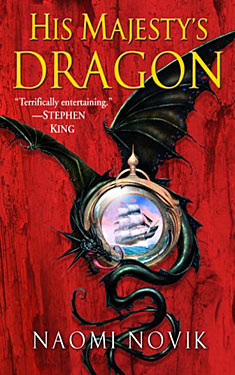 Now that’s what I call a fantasy adventure! The premise—Napoleonic Wars with dragons—is a bit over the top, but there is enough genuine emotion and excitement on display to suspend disbelief without any second thought. I mean; who needs verisimilitude? There’s dragons fighting over the Channel!
Now that’s what I call a fantasy adventure! The premise—Napoleonic Wars with dragons—is a bit over the top, but there is enough genuine emotion and excitement on display to suspend disbelief without any second thought. I mean; who needs verisimilitude? There’s dragons fighting over the Channel!
“It’s just some light reading” is a phrase often heard when defending books that lack depth, tight plotting, or engaging characters. His Majesty’s Dragon is the proof that a lighthearted tale is no excuse for shoddy writing. Yes, the story of Laurence and Temeraire is a light read: there is no philosophical treatise on the meaning of existence, no innovation in the turn of a phrase. But that doesn’t make it “just” a popcorn book. The characters are engaging, and the story is written with enough tenderness and care that it is easy to fall in love with the characters.
What really anchors the story is the relationship between Captain Laurence and his companion of fortune, the dragon Temeraire. It’s heartwarming to see them grow closer together, and their friendship is often touching and genuine. Let’s call it what it is: an inter-species bromance. Laurence by himself is not that engaging a character; he’s a bit stiff-lipped, and always offended by this or that breach of etiquette. But his genuine love for Temeraire, and the way this love ends up affecting other dragons, is really great to read. I couldn’t help laughing at the gruff relationship between Maximus and Berkley, for instance, or shed a tear for poor Levitas.
WoGF Review: The Drowning Girl by Caitlín R. Kiernan
 Daniel Roy (Triseult) is a writer, slow traveler, backpack foodie, endurance runner, and SF junkie. He has lived in Canada, China, and India, and currently resides in South Korea.
Daniel Roy (Triseult) is a writer, slow traveler, backpack foodie, endurance runner, and SF junkie. He has lived in Canada, China, and India, and currently resides in South Korea.
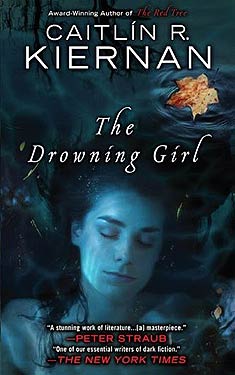 The Drowning Girl is the story of Imp, a woman struggling with schizophrenia who tries to exorcise her encounter, or encounters, with a siren, a ghost, a werewolf, or perhaps none of these things.
The Drowning Girl is the story of Imp, a woman struggling with schizophrenia who tries to exorcise her encounter, or encounters, with a siren, a ghost, a werewolf, or perhaps none of these things.
This synopsis might sound confusing, but it barely scratches the surface of this beautiful confusion of a novel. At times a stream of consciousness narrative, at others a mythological exploration, it often ventures into poetic and mythological flights of fancy, a journey to the heart of a soul in distress.
Imp herself is a magnificent protagonist, at once intelligent and vulnerable, self-aware and trapped in her own mind. One cannot help but feel strongly for her as her life takes a turn for the darker. She is an unreliable narrator through and through, even to herself, and trying to piece together the truth (or should I say, the facts) from her narrative is at once challenging and satisfying. She moves through her ghost story not through links of causality, but through symbols and associations, in the manner of the purest of fairy tales. She skirts around the edges of her pain, sometimes speaking in metaphor, sometimes lying. When the horror creeps into the story, it is that genuine night terror, the feeling of the world dissolving under the power of primordial symbols moving against you in the darkness.
GMRC Review: The Forever War by Joe Haldeman
 Daniel Roy (triseult), has contributed over 50 reviews to WWEnd including this, his fifth GMRC review to feature in the WWEnd blog. Daniel is living his dream of travelling the world and you can read about some of his adventures on his blog Mango Blue.
Daniel Roy (triseult), has contributed over 50 reviews to WWEnd including this, his fifth GMRC review to feature in the WWEnd blog. Daniel is living his dream of travelling the world and you can read about some of his adventures on his blog Mango Blue.
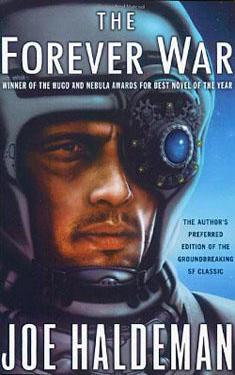 Great SF stories stand the test of time by transcending the period from whence they emerged. The Forever War, oddly enough, is timeless precisely because it is firmly rooted in a key period of world history. It manages to evoke, to this day, the horrors of Vietnam and the pain of returning veterans, and in so doing transcends them into a timeless discussion about the futility of war and how it uses up human lives.
Great SF stories stand the test of time by transcending the period from whence they emerged. The Forever War, oddly enough, is timeless precisely because it is firmly rooted in a key period of world history. It manages to evoke, to this day, the horrors of Vietnam and the pain of returning veterans, and in so doing transcends them into a timeless discussion about the futility of war and how it uses up human lives.
I first read The Forever War in comicbook form, thanks to Marvano’s amazing adaptation. Being a Belgian work, and thanks to its ligne claire style, the adaptation felt more universal, less rooted in the American war experience. The novel itself, though, is firmly American. You can glimpse the mind of a male Vietnam war vet as the story unfolds. This may not make the novel as universal as the comicbook adaptation, but it makes for a more powerful reading because of its roots in the American experience.
That’s not to say it’s a bad thing. It’s another great example how even SF writers should write what they know. A lot of the SF concepts work perfectly as allegory for the soldier experience, including the painful culture shock of returning home. The second part, during which Mandella returns home to a world he no longer knows, is gripping and powerful. I bet it must resonate a great deal with veterans of Afghanistan and Iraq.
GMRC Review: The Dispossessed by Ursula K. Le Guin
 Daniel Roy (triseult), has contributed over 50 reviews to WWEnd including this, his fourth GMRC review to feature in the WWEnd blog. Daniel is living his dream of travelling the world and you can read about some of his adventures on his blog Mango Blue.
Daniel Roy (triseult), has contributed over 50 reviews to WWEnd including this, his fourth GMRC review to feature in the WWEnd blog. Daniel is living his dream of travelling the world and you can read about some of his adventures on his blog Mango Blue.
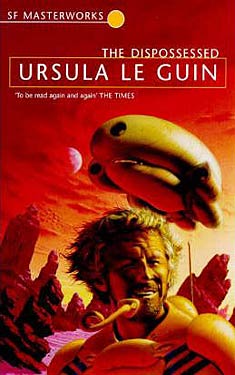 Calling this book “perfect” would do it an injustice. Its brilliance is not so much in meeting SF standards, but in exceeding them and leaving them far behind.
Calling this book “perfect” would do it an injustice. Its brilliance is not so much in meeting SF standards, but in exceeding them and leaving them far behind.
The Dispossessed is a complex novel. It’s not complex in terms of structure or themes; it’s not a hard book to read. Quite the opposite. But it manages to touch on so many aspects of the human experience at once that it’s hard to sum up what makes it so fascinating.
At the heart of it all is Shevek. Shevek, so complex and delightful to read. Shevek’s a hero, an outcast, a brilliant physicist, an idealist, an alien, a father, a lover, and a bit of a goof. He’s so many things at once that the only word to describe him is real. He anchors the whole story, brings it to life, fills it with emotion and thought. Through Shevek, Le Guin explores a plethora of themes: anarchism, politics, science, inspiration, love, responsibility, injustice, freedom. He’s the most realistic and inspirational fictional scientist I have ever read, and yet there is still time for him, in a mere 300 pages, to be a caring father and a poignant lover. Shevek’s awesome.
Some readers see in this book a plea for anarchism. I like the political theory, especially Noam Chomsky’s take on it, which he calls social libertarianism. By tackling anarchism, Ursula Le Guin is doing what SF should aspire to do every time: she explores a Great Idea, playing with it to see if it’s possible. In that sense, yes, she gives anarchism center stage, and gives it the space to make its plea. But I don’t think she set out to write a straight-up inspirational Utopia. Anarres doesn’t sound like such a great place to live.
 The utopia of The Dispossessed is Shevek, not Anarres. Anarres’ brand of anarchism is broken, bogged down by the usual power struggles and human pettiness. Anarres forgot that a revolution must continue, lest it becomes the new order. The real anarchist revolution of this story is Shevek. He is a stranger in his own home, and he exiles himself to another world to find it again. In so doing, he touches both worlds in unexpected ways–and far beyond.
The utopia of The Dispossessed is Shevek, not Anarres. Anarres’ brand of anarchism is broken, bogged down by the usual power struggles and human pettiness. Anarres forgot that a revolution must continue, lest it becomes the new order. The real anarchist revolution of this story is Shevek. He is a stranger in his own home, and he exiles himself to another world to find it again. In so doing, he touches both worlds in unexpected ways–and far beyond.
I can already see that this first read of The Dispossessed won’t be my last. This is SF of the first order, one that enriches my own world by its mere existence as a thought experiment. And besides, I have a feeling I’ll miss Shevek if we spend too much time apart.
GMRC Review: Tau Zero by Poul Anderson
 Daniel Roy (triseult), has contributed over 30 reviews to WWEnd including this, his third, for the GMRC. Daniel is living his dream of travelling the world and you can read about some of his adventures on his blog Mango Blue.
Daniel Roy (triseult), has contributed over 30 reviews to WWEnd including this, his third, for the GMRC. Daniel is living his dream of travelling the world and you can read about some of his adventures on his blog Mango Blue.
Tau Zero has been hailed as the quintessential hard SF novel, and it’s a well-deserved accolade. It shares some of the weaknesses of the genre, sure; but in its strengths it shines as an exceptional story, grounded in proper science, and brimming with mind-boggling ideas, hard science, and a scale rarely matched in SF.
Let’s get the weaknesses out of the way first. Yes, the character development is flimsy. And as with many other SF classics, it’s hard not to get irritated by its portrayal of women as fragile, irrational creatures. Most of the characters are interchangeable and forgettable, with the exception of Reymont, who turns into quite an interesting and complex character. The level of prose and character emotion can be summed up by the following two excerpts: the first, almost sensual, is a description of two space modules docking:
“[The ship’s] robots—sensor-computer-effector units—directing the terminal maneuvers caused airlocks to join in an exact kiss. More than that would be demanded of them later. Both chambers being exhausted, their outer valves swung back, enabling a plastic tube to make an airtight seal.”
The second describes a beautiful woman:
“Physically she was a big brunette, her features ordinary but the rest of her shown to high avantage by shorts and tee shirt.”
Oh, hard SF…
But anyway. Who reads hard SF for the character development and the prose? It’s all about the fascinating scientific concepts, and this novel has them in spades.
Review: Among Others by Jo Walton
Daniel Roy (triseult), has contributed over 30 reviews to WWEnd including 2 for the GMRC. Daniel is living his dream of travelling the world and you can read about some of his adventures on his blog Mango Blue.
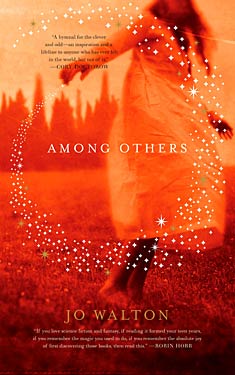 I love this book so much. It’s clever and inventive and filled with the kind of literary truth that leaves you breathless. Among Others received the Nebula Award, and even beat Miéville’s Embassytown to the Hugo. And you know what? Jo Walton totally deserved it.
I love this book so much. It’s clever and inventive and filled with the kind of literary truth that leaves you breathless. Among Others received the Nebula Award, and even beat Miéville’s Embassytown to the Hugo. And you know what? Jo Walton totally deserved it.
Among Others is something new in a genre already known for invention: it’s what I like to call “speculative autofiction.” It features the strengths of both SF and autofiction, and each genre adds to the other to transcend either into something refreshing and exciting. Among Others is the story of Welsh-born Morwenna, who ends up in a boarding school in England following mysterious tragic events involving her mother and twin sister. The story is told in the form of Morwenna’s diary, as she chronicles her life in this strange new environment. But Morwenna happens to see faeries, and knows how to use magic spells.
The ambiguity surrounding Morwenna’s magic is a piece of intricate, subtle, and clever world-building. It’s not the kind of magic that allows you to throw fireballs; as a matter of fact, it’s so subtle that if you stop believing in it, it might suddenly seem like a series of fortunate coincidences. Likewise, it’s not clear whether the faeries are real, or if they’re the product of a hyperactive child’s imagination. Yet as a fantasy system, the faeries and their magic work perfectly. They’re clever and inventive, and they work on many levels. Ultimately, the title of the novel itself is a piece of similar ambiguity: it’s not clear if the “others” in the title refers to faeries, or to the mundane world in which Morwenna struggles to survive.
GMRC Review: The Martian Chronicles by Ray Bradbury
 Daniel Roy (triseult), has contributed over 30 reviews to WWEnd including this, his second, for the GMRC. Daniel is living his dream of travelling the world and you can read about some of his adventures on his blog Mango Blue.
Daniel Roy (triseult), has contributed over 30 reviews to WWEnd including this, his second, for the GMRC. Daniel is living his dream of travelling the world and you can read about some of his adventures on his blog Mango Blue.
There are SF books that age superbly well, staying relevant and believable decades beyond their publication dates. The Martian Chronicles is not such a book; it’s a delicate antique, the fossilized remains of dreams and terrors gone by, of a time when Mars had water irrigation canals, and everyone feared death by atomic war. It may not have remained relevant, but its lyrical beauty is intact.
Martian Chronicles is a series of loosely connected short stories set on the planet Mars; more specifically, on the planet Mars as it existed in the collective consciousness of the 1950s, when the lines slashed across its surface were water canals built by an ancient and alien civilization. In 2012, it reads not so much as science fiction, but as a form of dreamy fantasy, an alternate universe where the science fiction dreams of the Martian wild frontier are true. This gives a charming air of naïveté to the stories, a nostalgia of dreams gone by, made impossible by the images sent back by Viking and Pathfinder.
There exists a quaint notion in the public’s mind that a SF author’s greatness can be measured by his or her power to predict the future: much attention is given to Isaac Asimov anticipating the Laws of Robotics, or of Arthur C. Clarke having predicted orbital satellites. But reading The Martian Chronicles, it’s obvious that great SF writers do not so much try to anticipate and predict the future, but rather dream of all possible futures.
That’s what the stories in The Martian Chronicles feel like; a dream. They possess a dreamy, ethereal quality, the descriptions filled with a deep sense of wonder and joy at the Universe, a lyricism and poetry that depart in a formidable fashion from the dry intellectualism of Bradbury‘s contemporaries at the time. The stories themselves are enchanting, sometimes gripping; they never grow grim, even if they deal with death, yearning, sometimes murder, sometimes outright war. Some of the stories present arresting imagery to this day: the sight of all African Americans, having given up on ever being granted full civil rights, gathering their belongings and leaving for Mars; or the clockwork rhythms of an automated house, calling the children to breakfast long after Earth has died in an atomic war.
 My biggest gripe with Martian Chronicles is the fate of the Martians themselves, and the relative lack of empathy given to what Bradbury imagined as beautiful, wise creatures. Their fate mirrors that of Native Americans, and perhaps because the novel was of its time, their destruction under the relentless wheels of colonization did not stir much sympathy in Mr. Bradbury. There was a huge opportunity to discuss the human/Martian cost of the American spirit of endeavor, but this is a theme which Mr. Bradbury has preferred should remain untouched.
My biggest gripe with Martian Chronicles is the fate of the Martians themselves, and the relative lack of empathy given to what Bradbury imagined as beautiful, wise creatures. Their fate mirrors that of Native Americans, and perhaps because the novel was of its time, their destruction under the relentless wheels of colonization did not stir much sympathy in Mr. Bradbury. There was a huge opportunity to discuss the human/Martian cost of the American spirit of endeavor, but this is a theme which Mr. Bradbury has preferred should remain untouched.
On a personal note, I began reading The Martian Chronicles on June 5th, 2012, unaware that Mr. Bradbury had passed away on that very day. By a strange twist of fate, despite having grown up with SF stories, I had never read any book by Mr. Bradbury before. I’m glad I finally, if a bit too late, learned to appreciate the greatness of his writings, and why so many authors consider him an inspiration.
When Mr. Bradbury passed away, Humanity has lost a dreamer. But judging by the beauty and grace of this book, the dreamer’s dreams live on.
GMRC Review: Emphyrio by Jack Vance
 Daniel Roy (triseult), has contributed over 30 reviews to WWEnd including this, his second, for the GMRC. Daniel is living his dream of travelling the world and you can read about some of his adventures on his blog Mango Blue.
Daniel Roy (triseult), has contributed over 30 reviews to WWEnd including this, his second, for the GMRC. Daniel is living his dream of travelling the world and you can read about some of his adventures on his blog Mango Blue.
Editor’s Note: This is a May GMRC review that we didn’t get around to posting in time.
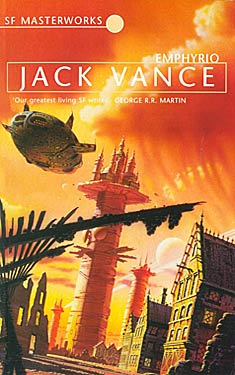 The great Jack Vance is sometimes described as a “gardener of worlds”, a description that encompasses much of the strength of Emphyrio. But unfortunately, for all the brilliant world-building, the novel lacks a certain dramatic tension, as well as a real appeal for the world it portrays.
The great Jack Vance is sometimes described as a “gardener of worlds”, a description that encompasses much of the strength of Emphyrio. But unfortunately, for all the brilliant world-building, the novel lacks a certain dramatic tension, as well as a real appeal for the world it portrays.
The world of Emphyrio is interesting, but strangely placid. There are otherworldly lords and ladies, and puppet-makers who build puppets of the flesh. There are spaceships and a plethora of worlds. But most of the story takes place on a small world of artisans, away from the most interesting aspects of Vance’s creation. Vance, instead, focuses on the workings of a “welfare society”, where artisans, deprived of any reproduction method whatsoever, must create beautiful works of art by hand, in order to receive a living wage.
The society Vance describes is interesting, but not very dramatic. There is a sense that this place is unjust and something of a repressive environment for the protagonist, Ghyl, and his father; but the form of repression they live through is pretty mild and unthreatening. There is no outburst of violence, no sense of impending doom; just a quiet rebellion against the ordained march of days of a woodcarver and his son.
 Likewise, Ghyl is not a fascinating protagonist. His obsession with a fragment of the legend of Emphyrio, and his slow draw away from his destiny as a woodworker, is well-written, but lacks dramatic tension. Action takes a long time to happen, and when it does, it doesn’t depict Ghyl in a very positive light. We’re meant to feel for him for being a noble outlaw, but I just found him easily manipulated, and too idealistic to realize the consequences of his criminal actions.
Likewise, Ghyl is not a fascinating protagonist. His obsession with a fragment of the legend of Emphyrio, and his slow draw away from his destiny as a woodworker, is well-written, but lacks dramatic tension. Action takes a long time to happen, and when it does, it doesn’t depict Ghyl in a very positive light. We’re meant to feel for him for being a noble outlaw, but I just found him easily manipulated, and too idealistic to realize the consequences of his criminal actions.
Overall, Emphyrio is well-written, and presents an original, evocative world. But the story told in this world lacks a punch that would make it as memorable as, say, To Live Forever.



















 Full Details
Full Details
